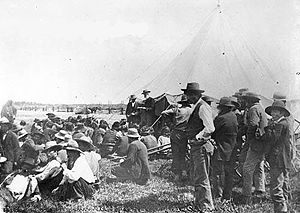Treaty 8
 David Laird explaining terms of Treaty 8, Fort Vermilion, 1899 | |
| Signed | June 21, 1899 |
|---|---|
| Location | Just south of present-day Grouard, Alberta[1] |
| Parties |
|
| Languages | English |
| Indigenous peoples in Canada |
|---|
 |
|
|

Treaty 8 is an agreement concluded on June 21, 1899, between the Crown and various First Nations of the Lesser Slave Lake area. The treaty was negotiated just south of present-day Grouard, Alberta.
Treaty 8 is one of eleven numbered treaties made between the Crown and First Nations. The Crown had between 1871 and 1877 signed Treaties 1 to 7. Treaties 1 to 7 covered the southern portions of what was the North-West Territories. At that time, the Government of Canada had not considered a treaty with the First Nations in what would be the Treaty 8 territory necessary, as conditions in the north were not considered conducive to settlement.[citation needed] Along with the Douglas Treaties, Treaty 8 was the last treaty signed between the Crown and the First Nations in British Columbia until the Nisga'a Final Agreement.
The boundary between Treaty 8 and Treaty 11 is disputed. The Yellowknives Dene First Nation asserts that it is a signatory to Treaty 8. But according to the text of the treaties, the Yellowknife Nation's territory, known as Chief Drygeese Territory, is within Treaty 11.
Background[]
In the mid-1890s, the Klondike Gold Rush began to draw non-indigenous people northward into territory they had previously not much contacted. The increased contact and conflict between First Nations of the region and non-indigenous people prompted the Government of Canada to enter into Treaty 8. In September 1899, the Treaty and Half Breed Commissioners finally concluded the treaty process, with 2217 accepting the treaty, and another 1234 people opting for scrip.
Treaty[]
The land covered by Treaty 8, 840,000 square kilometres (320,000 sq mi),[2] is larger than France and includes northern Alberta, northeastern British Columbia, northwestern Saskatchewan and a southernmost portion of the Northwest Territories.[3] Adhesions to this agreement were signed that same year on July 1, 1899, at Peace River Landing, July 6 at Dunvegan, July 8 at Fort Vermilion, July 13 at Fort Chipewyan, July 17 at Smith's Landing, July 25 and 27 at Fond du Lac, August 4 at Fort McMurray, and August 14 at Wabasca Lake. Further adhesions were in 1900 on May 13 at Fort St. John, June 8 at Lesser Slave Lake, June 23 at Fort Vermilion and July 25 at Fort Resolution.
was one of the First Nations signatories to Treaty 8. First Nations that are considered signatories to Treaty 8 include Woodland Cree, Dunneza (or Beaver) and Chipewyan. Other signatories included David Laird, Father Albert Lacombe, Rev. , Bishop Émile Grouard, , J.H. Ross, , James Walker, , , , , , , , , J.H. Picard, Richard Secord, M. McCauley, Headman , Headman , and Headman , Headman .
Albert Lacombe, a trusted Catholic missionary, had been asked by Canadian officials to be present to help convince First Nations that it was in their interest to enter into a treaty. He was present on June 21, 1899, and assured the First Nations that their lives would remain, more or less, unchanged. He was also present at some of the meetings at which adhesions were signed. The elements of Treaty 8 included provisions to maintain livelihood for the native populations in this 840,000 km2 (320,000 sq mi) region, such as entitlements to land, ongoing financial support, annual shipments of hunting supplies, and hunting rights on ceded lands, unless those ceded lands were used for forestry, mining, settlement or other purposes.[4]

See also[]
- List of treaties
- Numbered Treaties
- Status of First Nations treaties in British Columbia
- The Canadian Crown and First Nations, Inuit and Métis
References[]
- ^ "The Making of Treaty 8 in Canada's Northwest". Alberta Online Encyclopedia. 2009. Archived from the original on May 15, 2009. Retrieved August 1, 2009.
- ^ "Treaty 8". Government of Canada. Library and Archives Canada. 2009. Archived from the original on September 20, 2009. Retrieved August 1, 2009.
- ^ "1899 Treaty 8". Prince of Wales Northern Heritage Centre. 2009. Archived from the original on July 6, 2011. Retrieved August 1, 2009.
- ^ "Numbered Treaty Eight". Canadiana.org. 2009. Archived from the original on January 23, 2010. Retrieved August 1, 2009.
External links[]
- Treaty Texts - Treaty No. 8 from the Government of Canada
- Treaty 8 First Nations of Alberta
- Treaty 8 Tribal Association (British Columbia)
- List of Treaty 8 First Nations in Saskatchewan
- Ray, Arthur J. (1999). "Treaty 8: A British Columbian Anomaly". BC Studies. 0 (123): 5–58. ISSN 0005-2949. Retrieved 13 October 2010.
- Numbered Treaties
- Dane-zaa
- Political history of British Columbia
- Political history of Alberta
- Political history of Saskatchewan
- History of the Northwest Territories
- First Nations history
- Treaties concluded in 1899
- Treaties concluded in 1900
- 1899 in Alberta